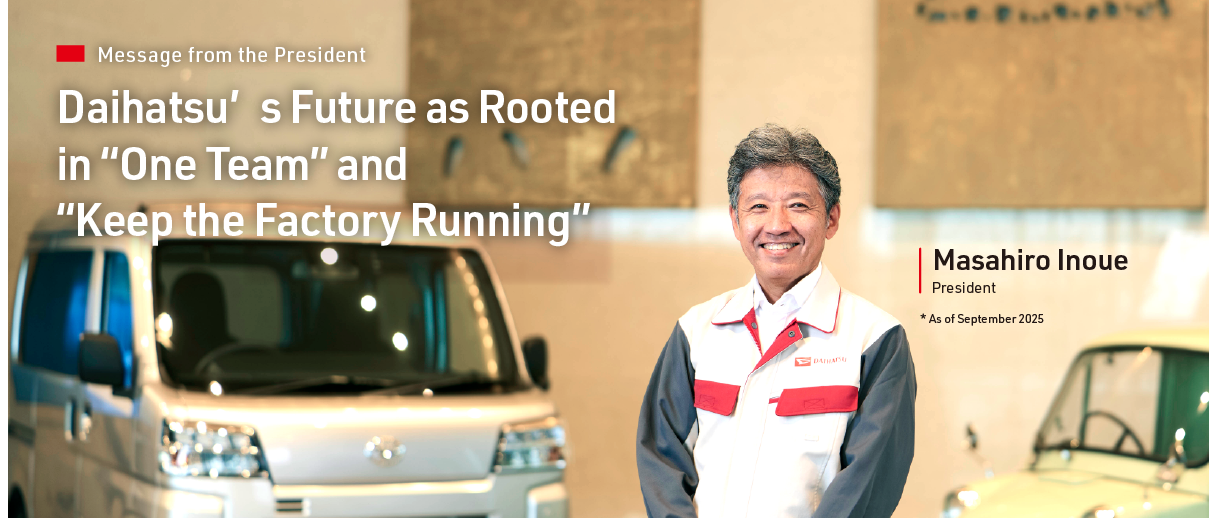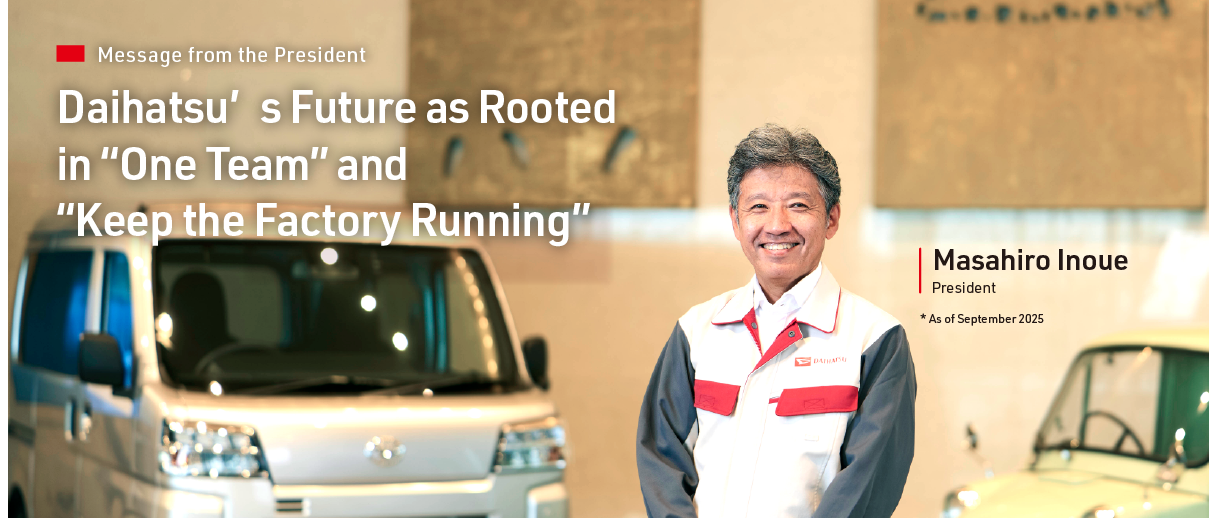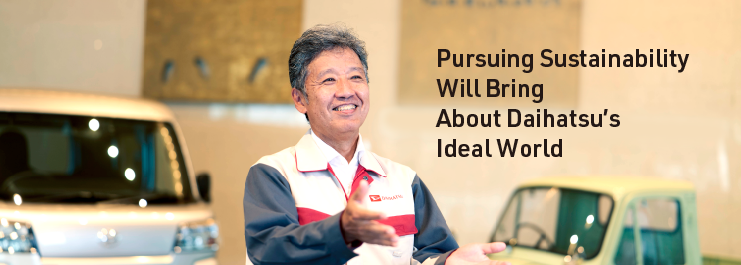

Message from the President
Daihatsu’s Future as Rooted in“One Team” and “Keep the Factory Running”
One Team and Keep the Factory Running: My Origins and Management Approach
I assumed my current role as Daihatsu’s president in 2024. In my roughly 38 years as a working adult, I have worked in a wide range of fields covering manufacturing, sales, and product planning. In addition to Japan, I have also been on the front lines in Canada, Brazil, Argentina, and other work sites around the globe. Throughout this time, two phrases have captured my core management principles:“One Team” and “Keep the Factory Running.”
“One Team” refers to something I felt keenly when I was responsible for our Brazil and Argentina businesses. Because we are a Japanese company, work sites came into conflict with the South American business due to differences in language, culture, and values, with energy being wasted internally rather
than focusing on the company’s competitors. rather than focusing on the company’s competitors. I served as a neutral mediator between the two parties, and with thorough persistent negotiations, I worked to build a relationship that would draw on the strengths of each side. Eventually, trust blossomed, and both sides were able to function as a team. This experience is engraved deeply in my heart.
“One Team”is not just a slogan. It is an approach in which parties with different viewpoints and values share a common goal and cooperate to achieve it. Achieving this requires us to build trust on the front lines and engage in ongoing dialogue. For Daihatsu, which has many sites and partners in Japan and overseas, this culture is an essential part of our sustainable growth in the future ahead.
The other principle, “Keep the Factory Running,”is a phrase that my superior on the sales team at Toyota Canada would always use to instruct me.
No matter how wonderful a product is, it only demonstrates its value when a customer chooses it and makes a purchase. Manufacturing, logistics, and services can only keep running if customers choose our products. I believe our purpose as a manufacturer is to continue providing products to customers.
Confronting Decarbonizing Head-on and Choosing Optimal Solutions
The automobile industry is currently at a once-ina-century turning point. The global industry is undergoing electrification at an accelerating pace to meet carbon neutrality goals, but I have consistently held the perspective that we need to target “carbon”itself without insisting on a particular method of doing so. Although there is a focus on BEVs (battery electric vehicles), the reality is that much of the power for those vehicles comes from thermal power plants. Taking that into consideration, BEVs do not necessarily lead directly to decarbonization.
The Toyota Group uses a Multi-pathway Strategy in which strategies that are most optimal for each country and region can be selected, drawing on a diverse array of technologies including HEVs (hybrids), PHEVs (plug-in hybrids), BEVs, internal combustion engines with good fuel efficiency, and biofuels and ethanol. For example,Brazil uses sugarcane ethanol as fuel for vehicles, and is working towards carbon neutrality by a path other than electrification.
At Daihatsu, we also work toward carbonneutral production. We are developing ways to utilize fuels derived from nature, including biogas made from cow manure. We will continue steadily progressing toward full decarbonization by combining front lines ingenuity and wisdom.
Supporting "Just Right": Co-creation and Personnel Development at Work Sites
The chief source of Daihatsu’s competitive strength is our ability to achieve “high quality but affordable products.” Through close collaboration with around 600 suppliers, we conduct cost planning that balances cost and quality beginning in the initial product development stage. As base costs increase in the future due to the implementation of hybrid and electrification technology, it will be key to provide products to customers at an attainable price while maintaining as much added value as possible. By deepening the relationships with our suppliers, we will continue providing consumers from all walks of life with vehicles that are “just right.”
We must also keep sight of the need to pursue human resources development. Encouraging personnel to gain experience on the front lines while they are still young in a wide range of workplaces
around the world will help cultivate reliable judgment over long careers. Also, one of my favorite sayings is the traditional Japanese adage that translates to“God knows everything” (so always do the right thing). Internal infrastructure that ensures hard work is recognized and properly rewarded promotes trust in the organization as a whole. We will build an environment in which everyone has the opportunity to demonstrate their abilities, regardless of gender or other personal attributes.
Daihatsu Manufacturing Supporting People’s Lives Around the World

The Japanese domestic market is expected to continue shrinking in the years ahead. We currently sell 900,000 units per year*, and this is a basic foundation that must be maintained. Our global market has just cleared 1.1 million units* and is the core of our growth. Especially in ASEAN countries, Daihatsu-developed vehicles are widespread and popular under the Toyota and Perodua brands.
Rather than focusing on the Daihatsu brand, I believe it is important that we bring “Daihatsu manufacturing” to the world at large. As competition intensifies, our brand strategy will need to be more flexible, but Daihatsu will never compromise on our core design, manufacturing, and quality. This is our crucial role within the global Toyota Group as a whole.
Mobility will not change overnight. But over periods of 20 or 30 years, society does undergo steady change. In the future, Daihatsu will continue to stay closely in touch with the needs of customers from all walks of life, never miss signs of change,
and keep a persistent eye on the realities of every region in which we operate in order to continue making the vehicles that are most needed.
*Includes Daihatsu-developed vehicles manufactured by OEMs and contractors
To Our Stakeholders
Daihatsu is not merely an automobile manufacturer. We are also a supporter of lives in local communities as well. I have witnessed first-hand the impact of temporary plant closures on local economies. That is why I feel we have a responsibility to “Keep the factory running” and continue contributing to employment and the economy over the long term.
We have had fewer opportunities for external communication in recent years, and I feel that the real Daihatsu has not been adequately conveyed. That is why I want to use this Sustainability Report and our new open internal newsletter “Daihatsu ONE!” to show our stakeholders the real Daihatsu, as we really are, in honest, easy-to-understand, relatable language.
Daihatsu will continue to work to develop a sustainable future by building One Team with our local communities, suppliers, personnel, and customers in our role as the “world’s leading automobile manufacturer rooted in everyday life.”